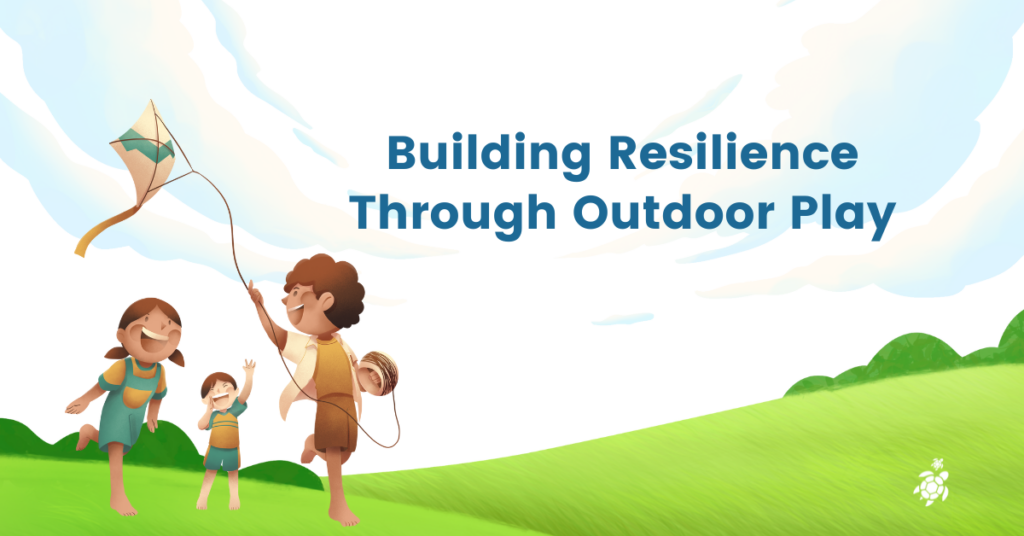
When was the last time your child spent an afternoon running through a park, building a fort in the woods, or playing tag with friends under the open sky? April is Move More Month, a perfect opportunity to highlight the importance of outdoor play—not just for physical health, but for mental and emotional well-being, too.
Nature offers more than just a respite from screens and the daily grind. It fosters resilience, reduces stress, and enhances overall emotional health in children (and adults!).
The Mental Health Benefits of Outdoor Play
Research increasingly reveals the significant role of outdoor play on children’s mental health. Whether it’s a walk in the woods or playing in the backyard, here are some key benefits for your family to consider:
Reduces Stress and Anxiety
Time spent outdoors has been shown to lower cortisol levels, which helps reduce stress and anxiety in children. The American Psychological Association (APA) has reported that being outdoors creates a calming effect, improving overall mental health. Activities as simple as walking in a park or observing greenery can help children feel more relaxed.
Boosts Creativity and Problem-Solving Skills
Natural settings spark creativity in a way that structured indoor activities often can’t. Building forts, collecting natural objects, and other open-ended play activities encourage children to think in new ways and solve problems independently.
Improves Focus and Attention
Green spaces are particularly beneficial for children struggling to focus. Spending just 20 minutes outdoors can improve attention spans and reduce hyperactivity in children with ADHD.
Supports Better Sleep and Overall Well-Being
Physical activity paired with fresh air promotes healthy sleep patterns. When children sleep better, they feel better, which supports their emotional and physical resilience. The combination of sunlight, fresh air, and exercise helps regulate sleep cycles, contributing to better mental health.
Strengthens Family Bonds
Outdoor play doesn’t just benefit kids! It’s an excellent way to bring families closer together. Shared activities like hiking or gardening create positive memories and deepen emotional connections.

How to Encourage Outdoor Play
Think you’re too busy to prioritize outdoor play? Even small changes can make a big difference! Here are five practical tips families can adopt to encourage outdoor time:
1. Schedule Outdoor Time Daily
Make outdoor playtime part of your routine. Even 30 minutes in the yard, at a park, or on a walk around the block can have lasting benefits.
2. Explore Local Nature Spots
Take advantage of nearby parks, trails, or nature reserves to keep things exciting. Look for places where your child can safely run, explore, and interact with the environment. The U.S. Forest Service provides a directory of forest areas and trails to help families explore nature safely.
3. Choose Family-Friendly Activities
Activities like biking, kite flying, or gardening can turn outdoor time into fun family time. These shared experiences strengthen bonds while helping everyone unwind. Check out these ideas for family-friendly outdoor adventures from The National Wildlife Federation. Also, check out these great ideas from the Children & Nature Network!
4. Encourage Imaginative Play
Provide opportunities for children to engage in creative, unstructured play in natural settings. Simple activities like building forts or creating art with leaves and twigs allow children to explore and create in meaningful ways.
5. Set Screen Time Boundaries
Replace excessive screen time with outdoor activities. Setting limits on electronics and encouraging outdoor exploration fosters a well-rounded, balanced lifestyle. The American Academy of Pediatrics provides guidelines on screen usage to promote a balanced lifestyle through “The 5 Cs of Media Use“.

Why Outdoor Play is an Investment in Resilience
Encouraging outdoor play goes beyond physical benefits by helping children build emotional resilience, confidence, and coping skills.
Kids who regularly engage with the outdoors develop stronger coping skills, increased self-confidence, and better emotional regulation. These are qualities that make them better equipped to manage stress and adapt to new challenges, skills that will benefit them throughout their lives.

Make the First Move
Parenting comes with countless responsibilities, but prioritizing outdoor play can lead to significant improvements in your child’s mental health and happiness. Start with small steps—visit a local park, go for a family bike ride, or simply play in the yard.
At Child Guidance Center, we’re here to support families in building strong, resilient children. If you’d like guidance on supporting your child’s emotional wellness, reach out to us.
Take that first step today and reconnect with the great outdoors.